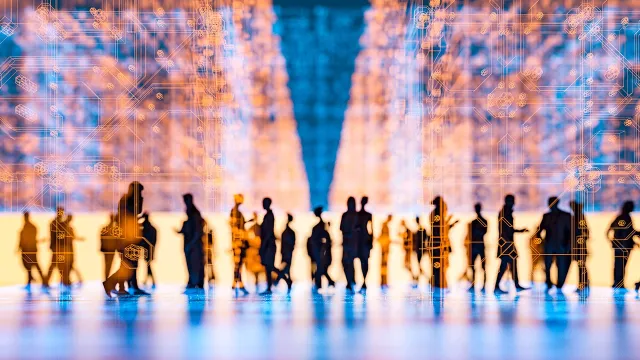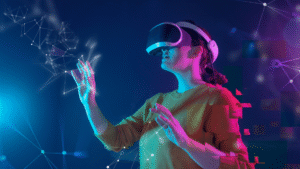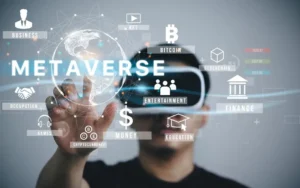What Is the Metaverse, Really?
Imagine stepping into a world where you can attend a concert, work in a virtual office, or explore a digital city—all without leaving your couch. The metaverse is a collective virtual space that blends augmented reality (AR), virtual reality (VR), and the internet, creating immersive environments where users interact via avatars. It’s not just a sci-fi dream; it’s a rapidly evolving digital frontier that’s reshaping how we connect, work, and play. From gaming platforms like Roblox to corporate experiments by Meta, the metaverse is already here, and its impact on society is profound.
The Promise of a Connected World
The metaverse offers a tantalizing vision of connectivity. It’s a place where physical distance doesn’t matter—you can collaborate with colleagues in a virtual boardroom or hang out with friends in a digital café. This could redefine social interaction, making it more inclusive for those who face physical or geographic barriers. But is it all rosy? Let’s dive into how this digital universe is reshaping society, for better or worse.
Social Connectivity: A New Way to Bond
The metaverse allows people to interact in ways that feel almost real. Think of attending a virtual wedding where you can dance with the couple’s avatars or joining a global book club without worrying about time zones. These experiences foster a sense of belonging, especially for those who feel isolated in the physical world.
The Power of Avatars
Avatars let users express themselves in ways they might not in real life. A shy person can become a confident virtual performer, and someone with mobility issues can explore digital landscapes freely. This freedom can boost self-esteem and creativity, but it also raises questions about identity and authenticity.
Breaking Down Geographic Barriers
No plane ticket? No problem. The metaverse connects people across continents, making global collaboration seamless. I once joined a virtual conference in a 3D space, chatting with folks from Tokyo to Toronto as if we were in the same room. It was thrilling, but I couldn’t help wondering if we were losing something human in the process.
The Dark Side of Virtual Connection
While the metaverse can bring us together, it also risks driving us apart. Spending hours in a virtual world might weaken real-world relationships. I’ve seen friends get so absorbed in VR games that they skipped family dinners. The line between digital and physical life is blurring, and not always for the better.
Addiction and Escapism
The immersive nature of the metaverse can be addictive. Studies suggest that excessive VR use may lead to dissociation or neglect of real-world responsibilities. It’s easy to escape into a perfect digital world, but what happens when you log off and face reality?
Social Exclusion Risks
Not everyone can afford the headsets or high-speed internet needed for the metaverse. This creates a digital divide, where only the privileged fully participate. If society splits into “metaverse haves” and “have-nots,” inequality could worsen.
Transforming Work and Productivity
The metaverse isn’t just for play—it’s changing how we work. Companies like Microsoft and Meta are building virtual offices where employees collaborate in 3D spaces. This could revolutionize remote work, but it also brings challenges that we’re only beginning to understand.
Virtual Workspaces: The Future of Offices?
Imagine attending a meeting in a virtual boardroom with holographic colleagues. Companies are betting on this to boost productivity and creativity. A 2022 study found that 70% of remote workers felt more engaged in VR meetings compared to Zoom calls.
Pros and Cons of Virtual Work
- Pros: Flexible work environments, reduced commuting costs, global talent access.
- Cons: Potential for burnout, privacy concerns, and the need for expensive tech.
Real-World Example: My Virtual Internship
Last year, I tried a virtual internship in a metaverse platform. I “walked” into a digital office, collaborated on projects via avatars, and even attended a virtual coffee break. It was fun and efficient, but I missed the spontaneous chats by the water cooler. The metaverse can mimic real life, but it’s not quite the same.
Economic Opportunities in the Metaverse
The metaverse is creating new economies. From virtual real estate to digital fashion, people are making real money in virtual spaces. For example, a virtual plot in Decentraland sold for $2.4 million in 2021. But with opportunity comes risk, like scams and unstable digital markets.
Jobs of the Future
New roles are emerging, like metaverse architects and avatar designers. These jobs require skills in 3D modeling, blockchain, and UX design. If you’re curious about breaking into this space, platforms like Coursera offer courses on VR development.
The Risk of Exploitation
Not all economic impacts are positive. Low-wage workers in developing countries might be hired to moderate toxic metaverse content, much like current social media moderators. This raises ethical questions about labor conditions in virtual economies.
Education in the Metaverse: A Game-Changer?
Education is one of the most exciting areas for metaverse growth. Virtual classrooms can make learning immersive and accessible, but they also come with hurdles that need addressing.
Immersive Learning Environments
Picture a history class where students “visit” ancient Rome or a science lab where they dissect a virtual frog. A 2023 study found that students in VR classrooms retained 20% more information than in traditional settings.
Benefits for Students and Teachers
- Engaging Lessons: Interactive simulations make learning fun.
- Accessibility: Students with disabilities can participate more fully.
- Global Reach: Rural students can access world-class education.
Challenges to Overcome
High costs and technical issues can limit access. Plus, not all teachers are trained to use VR tools effectively. Schools need to invest in both tech and training to make this work.
Real-World Impact: A Teacher’s Perspective
A friend who teaches high school biology shared how her students loved a VR dissection module. They were more engaged than ever, but she struggled with glitchy software and students getting distracted by the “cool” factor. It’s a powerful tool, but it’s not a magic fix.
Healthcare and the Metaverse: Healing in Virtual Spaces
The metaverse is making waves in healthcare, from virtual therapy sessions to surgical training. It’s exciting, but it also raises concerns about privacy and efficacy.
Virtual Therapy and Mental Health
Therapists are using VR to treat phobias, PTSD, and anxiety. Patients can confront fears in a safe, controlled environment. A 2022 study showed VR therapy reduced anxiety symptoms by 30% in some patients.
Why It Works
VR therapy offers immersive exposure that traditional methods can’t match. For example, someone afraid of heights can “stand” on a virtual skyscraper, guided by a therapist. It’s effective but requires careful oversight to avoid overwhelming patients.
Surgical Training and Telemedicine
Surgeons are practicing complex procedures in VR, reducing errors in real surgeries. Telemedicine in the metaverse could also let doctors “meet” patients in virtual clinics, improving access for remote communities.
Privacy Concerns
Healthcare data in the metaverse must be secure. Imagine hackers accessing your virtual therapy session—it’s a nightmare scenario. Robust encryption and regulations are critical to protect users.
Cultural and Psychological Impacts
The metaverse isn’t just tech—it’s a cultural shift. It’s changing how we see ourselves and interact with others, with effects that ripple into the real world.
The Proteus Effect: Who Are You in the Metaverse?
The “Proteus effect” suggests that our avatar’s appearance influences our behavior. If you’re a confident superhero in the metaverse, you might act bolder in real life. But what happens if your avatar promotes negative stereotypes?
Identity and Self-Expression
Avatars let people experiment with identity, which can be empowering. A transgender friend told me they felt freer expressing their true self in a virtual world. Yet, there’s a risk of losing touch with your real-world identity.
Mental Health Risks
Spending too much time in the metaverse can lead to dissociation or addiction. Posts on X highlight concerns about VR exacerbating mental health issues, especially for teens. We need more research to understand these risks fully.
Ethical and Societal Challenges
The metaverse isn’t a utopia—it’s a mirror of society’s flaws. Issues like privacy, harassment, and inequality are amplified in virtual spaces.
Privacy and Data Security
Every click in the metaverse generates data. Companies like Meta have faced scrutiny for mishandling user data, raising concerns about surveillance in virtual worlds. Always check privacy policies before diving in.
How to Stay Safe
- Use strong passwords and two-factor authentication.
- Avoid sharing sensitive info in virtual spaces.
- Choose platforms with clear data protection policies.
Harassment and Cyberbullying
Virtual worlds can be breeding grounds for toxic behavior. Anonymous avatars make it easy for bullies to target others. Platforms must invest in moderation to keep users safe.
A Personal Encounter
I once joined a public VR chatroom and was shocked by the abusive comments hurled at new users. It felt like the Wild West—fun until it wasn’t. Strong community guidelines are essential to prevent this.
Inequality and Access
The metaverse could widen the digital divide. High-end VR headsets cost hundreds of dollars, and reliable internet isn’t universal. Governments and companies must work to make access equitable.
The Economic Ripple Effect
The metaverse is a goldmine for some, but it’s not without risks. From virtual goods to digital real estate, the economic landscape is shifting fast.
Virtual Economies: Boom or Bust?
Digital assets like NFTs and virtual land are creating millionaires, but they’re also speculative. In 2023, a virtual Gucci bag sold for $4,115—more than its real-world counterpart. Yet, market crashes can wipe out investments overnight.
Comparison: Real vs. Virtual Economies
| Aspect | Real Economy | Virtual Economy |
|---|---|---|
| Currency | Fiat (e.g., USD) | Cryptocurrency/NFTs |
| Accessibility | Physical infrastructure needed | Internet and VR hardware needed |
| Risk | Regulated markets | High volatility, scams |
| Opportunity | Traditional jobs | New roles (e.g., avatar design) |
Monetization Opportunities
Want to cash in? Here are some ways to get started:
- Sell virtual goods: Design clothes or accessories for avatars.
- Create content: Stream metaverse experiences on platforms like Twitch.
- Invest in virtual land: Buy and develop digital real estate (but beware of bubbles).
People Also Ask (PAA)
What are the social impacts of the metaverse?
The metaverse can enhance social connections by enabling global interactions but risks addiction and weakened real-world ties. It may also exclude those who can’t afford the tech.
How does the metaverse affect mental health?
It offers therapeutic benefits, like VR therapy for anxiety, but excessive use can lead to dissociation or addiction, especially in vulnerable groups like teens.
Can the metaverse improve education?
Yes, it creates immersive learning experiences, like virtual field trips, but challenges include high costs and the need for teacher training.
Is the metaverse safe for users?
Safety depends on strong privacy policies and moderation. Risks include data breaches and cyberbullying, so choose platforms wisely.
FAQ Section
How does the metaverse impact the economy?
It creates new jobs and markets, like virtual real estate and digital fashion, but also risks scams and inequality due to high entry costs.
What tools do I need to access the metaverse?
You’ll need a VR headset (e.g., Oculus Quest), a powerful PC or console, and high-speed internet. Budget options exist, but premium experiences require investment.
Where can I learn more about the metaverse?
Check out platforms like Coursera or Udemy for courses on VR and metaverse development. Follow tech blogs like TechCrunch for updates.
Are there risks to using the metaverse?
Yes, risks include addiction, privacy breaches, and cyberbullying. Always use secure platforms and limit screen time to protect your well-being.
What are the best metaverse platforms to explore?
Try Roblox for gaming, Decentraland for virtual real estate, or Horizon Workrooms for professional collaboration. Each offers unique experiences.
Looking Ahead: The Metaverse’s Future
The metaverse is a double-edged sword. It’s a playground of possibility, offering new ways to connect, learn, and earn. But it also brings risks—addiction, inequality, and ethical dilemmas. As we navigate this digital frontier, we must balance innovation with responsibility. Whether you’re a gamer, a teacher, or a curious explorer, the metaverse is reshaping our world. The question is: will it bring us closer together or pull us further apart? Only time will tell, but one thing’s certain—it’s a journey worth watching.







